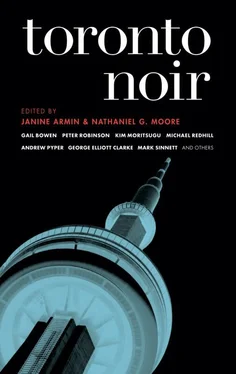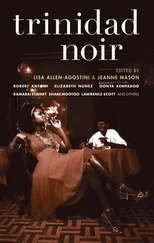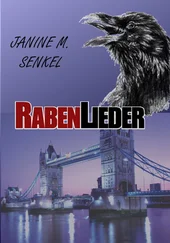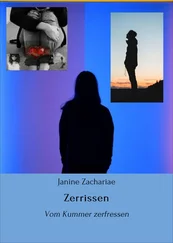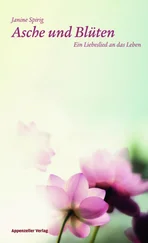Miguel, their tour guide, was such a man. Short and compact in body, barrel-chested, with a few uneven black sprigs of hair for a beard, he had a thin, rosy scar along his jawline and the haircut of a more urban, moneyed man. When he smiled, Beth noted his strong, small, pointy teeth.
This was in a café in Lago Agrio, way-station for travelers, frontier town for the desperate and entrepreneurial. She and Paul had been waiting a long time on a patio, clinking their cups of Nescafé against their saucers.
“Do you think that’s him?” Paul pointed toward the street, where a mocha-skinned man was pulling a trolley. They were to expect a guide who spoke five languages, a war veteran, friendly and “uninhibited,” the keen teenager who booked their trip had reassured them. When Miguel appeared it was from within the rendezvous restaurant; his arms made his T-shirt bulge with their baseball-sized biceps and he was sporting cheap orange flip-flops, which he continued to wear for the duration of the journey, exposing his long, yellowy-tough toenails, and making the rest of the tour group, in their beige, super-tread hiking shoes, feel subtly, wonderfully mocked.
On the bus to the oversized, motorized canoe, which was to take them to their campsite, the dust from the window made Beth cough, and the rutted roads caused the bus to jump. The inside of her head was all jangly with priorities and survival, and she felt sunburned although she had not been in the sun. She nodded to the two Germans who had joined the group, and then pushed past Paul, who was sleeping, a thin line of spittle reaching from his bottom lip to the strap of his day pack, which he had, wary of pickpockets, left attached to his back.
“Do you mind?” She motioned to the vacant aisle seat next to Miguel.
“Not at all,” he said. “You are welcome.”
She sat next to him, not speaking, trying to catch her breath.
“You are having some difficulty, some respiratory difficulty?” He turned toward her, face creased with concern and something else — amusement or maybe lust?
“I’m fine,” she said, and took in a big lungful of air, right down into her diaphragm, as she’d learned in a few yoga classes and tricky situations.
“Good,” he said and went back to his book.
Beth closed her eyes, but that made her dizzy, so she opened them. It was difficult, sitting on the aisle, to find a place to look. Straight ahead meant a row of seatbacks, brown vinyl and grimy. It meant absorbing the reality of the interior of the bus, a rollicking, wretched press of passengers, bulky bags, boxes, and bound chickens. It meant considering which qualifications, exactly, were required to drive a bus in this strange country. And looking outside, well, that would involve craning over Miguel to the window so that her head was positioned directly above his crotch.
Also, Beth was experiencing traveler’s terror — the pervasive notion that each moment represented a small treasure trove of noteworthy difference, of sights, sounds, smells completely and utterly foreign to what she had ever encountered, and that she would never pass this way again . She pivoted her body and her breast grazed Miguel’s arm. She muttered an apology, and squinted out at the side of the road. Outside was both hazy with dust and excessively green. The foliage looked prehistoric — gigantic ferns bowing chaotically to the palms reaching high up into the cloudless sky. This was it — the jungle. Miguel shifted to turn the page of his book and she felt obliged to speak. “What are you reading?”
He closed the book to show her the cover, a sepia-toned watercolor of a barn with a fair-haired woman standing in the foreground looking to the horizon. In the top right-hand corner of the book was a gold seal. Beth peered at it. It was one of Oprah’s book club picks. Miguel was watching her.
She had no idea what to say. The man in the tour agency had told them Miguel still had a bullet in his thigh from fighting in the border dispute with Peru. Finally she settled on, “Any good?”
Miguel nodded eagerly. “Very good, and it helps me to practice, to stay fluent, use new words.” He opened the book to the page he was on. “What does this mean?” He pointed to a word.
Beth did not know what the word meant. She took the book from Miguel and read the blurb on the back. A multigenerational saga set in the American Midwest with a complicated, malevolent patriarch at its core. “Must be dialect,” she said, shaking her head. “Sorry.”
“It’s okay.”
But she knew she had fallen in his estimation. She glanced out the window again. There were black pipes running alongside the road that seemed to be made out of the same plastic used to make heavy-duty sports drink bottles. The pipes didn’t look very serious, especially next to the profusion of vine and leaf that surrounded them. They passed a length of pipe covered in white spray paint. Beth caught the word OXY repeated in messy, angry capital letters. “What is that?”
Miguel closed his novel, placing a purple bookmark in its pages. “Oil pipelines,” he said. “My people, the people of the river, the Siona, they want the oil companies out. They’re sabotaging our home. We have stopped them before. We are well-organized, and although it is not entirely in our nature, we protest peacefully.”
“Is it true you have a bullet in your thigh?” Beth blurted, somewhat fanatically.
Miguel nodded. “My partner was not so lucky,” he said.
From across the aisle, Beth heard what sounded like a deliberate sniff from Paul. Perhaps it was warranted. But she was mesmerized by Miguel’s offhand manner, his apparent obliviousness to his own glaring, gaudy contradictions.
She wondered where Miguel was now, envisioned him paddling valiantly, hopelessly through the unthinkable sludge his river had become. Or maybe not. Instead: in a hotel room in town, his head between the legs of one of the other “uninhibited” citizens of El Oriente. The women of Lago Agrio had been as colorful and intent as the jungle birds; their tight green leggings, pink stilettos, and bands of quivering exposed flesh spoke mostly of joy and heat.
Paul was speaking to her, saying something about the political situation in South America. “It was Occidental, Beth. You know, the one they’ve been protesting for years. Here, then, is irony. Finally, they get them to admit their free trade has been anything but. They manage to oust them from the land, to reclaim what is theirs. And then, this. I wouldn’t be surprised if it’s the Man simply asserting his dominance. Oops, spilled some oil in your fresh, piranha-infested, life-giving waters. Sorry about that, but you shouldn’t have asked us to leave so rudely. We were, after all, your guests. And were we not gracious? Did we not give your people training and jobs? Oh, we know. The rule of law. But what about the rule of the jungle?” Paul was clicking around the website as he spoke, searching madly for clues.
She still could not quite grasp what he had shown her. There were ramifications, she knew, delicate ecosystems, butterflies on one side of the world flapping their diaphanous blue wings, while on the other side lucky humans sampled sushi; everything explained by a near-invisible knotted string you could follow back to a few greedy men with polished scalps and eyes like hunks of coal dreaming of the ninth hole and profit charts that explained their own lives to them in triplicate.
And then panic pushed like a spring shoot through the loam of her thoughts. She remembered Miguel, as she had been remembering him suddenly and without apparent justification, since she returned to her house on Willard Avenue with her husband of thirteen years, in the west end of Toronto, here amidst some tall buildings, next to a river and a lake, where she lived and would maybe die. Since childhood she had pinned herself to this map. It reassured her to know the order of her own locale. She knew the earth did not belong to her but to her grandchildren, and perhaps not even to them. But what if there were no children, no grandchildren, and the generational link was lost? One day she would be old, bereft, still angry... The image of that other equatorial river she had also begun to call her own, lying like a dark, drugged serpent, flashed into her mind. She turned to Paul. “I’m going to the river.”
Читать дальше
